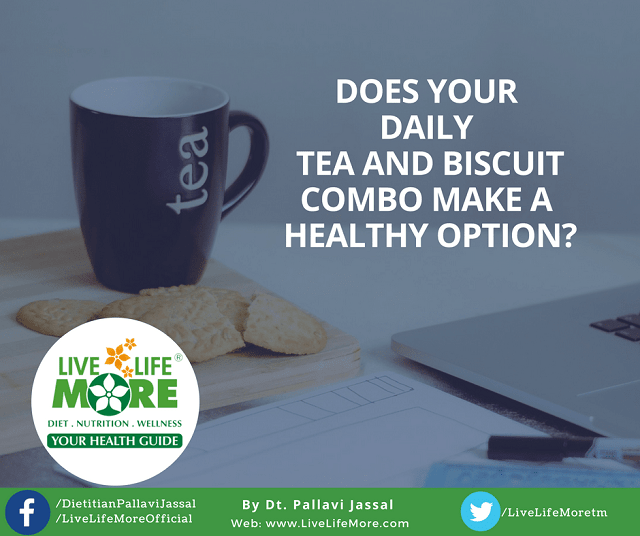Imagine your life without the Tea and Biscuit combo especially if you are from north India. For most of us, the moment of sheer relaxation is the moment of holding a hot cup of favorite tea with a tray filled with the variety of biscuits. It’s been a custom to entertain ourselves or our guests with this so-called light snacking option. Not just at home, a piping hot cup of tea is sold like hot-selling cakes in every street of India.
Everyone has a specific preference for his type of tea like Milk Tea, Masala Tea, English Breakfast, Darjeeling green, Oolong Tea, Green Tea, White Tea, Yellow Tea, Dark Tea, Black Tea etc. Similarly, biscuit fans have a wide list of varieties available nowadays on market shelves. But, for weight watchers, the most common trend these days to consume the digestive version of biscuits and not the common biscuits. Can you relate to this???
Well, if you think that biscuits are healthy… The answer is NO… all the varieties of biscuits or cookies are just the same & can truly be categorized as processed foods, no matter what brand name has been printed on the packet.
This article thus brings out some eye-opening nutritional facts about the so-called & believed combination of TEA & BISCUITS.
FACTS ABOUT TEA
India is a largest tea drinking country in the world. But consuming as the first thing after you wake up or drinking it too frequently throughout the day, is not a wise choice. Wanna know why…
- It increases acid production in the stomach – Our stomach produces acid (HCl/ Hydrochloric Acid) to digest food well. Even at fasting state, the ph of the stomach remains acidic around 1-2. Thus, consuming tea as the first thing in the morning after overnight fast or consuming it as the main fluid source in a day, can lead to hyperacidity and thus, gastric problems like ulcer, bloating, constipation can happen.
- It causes dehydration because drinking too much tea may have diuretic action i.e. increasing urine output. Tea results in water to be drawn out from the tissues causing dehydration.
- It may cause indigestion, due to the presence of milk as an important ingredient, tea can cause symptoms of indigestion.
FACTS ABOUT BISCUITS
The eye-catching word on the packet is WHOLEMEAL WHEAT FLOUR – used as the main ingredient. But actually, these biscuits are mass produced that contain primarily whole wheat flour, malic acid, & tartaric acid, vegetable oil, powdered skim milk, sugar and of course baking soda (sodium bicarbonate). The baking soda in the baked goods will not help in digestion because the heat of the baking oven alters its properties but surely has sodium intact which can increase blood pressure or increase water retention.
How many digestive biscuits do you eat each time? The most common answer is …TWO!! But from a health expert’s point of view, you should not incorporate even the digestive biscuits in bulk quantity in your routine diet.
Two digestive biscuits contain about:
- 150 calories.
- 20 g carbs.
- 5 g Sugar.
- 2 g proteins.
- 1 g fiber.
A single biscuit contains about 75 calories. Proving them to be high in energy with very little nutritional value.
On the contrary, a large apple contains around 90 calories with loads of additional nutritional value. Or a fistful of roasted nuts is also a better option to munch.
Don’t choose by name, know what’s actually in!
All biscuits are made from similar ingredients & are not exactly a great source of nutrition as commonly believed. The usual ingredients in a digestive biscuit are-
1. SUGAR- The sugar content of digestive biscuit may not be as high as regular biscuits but is enough to not to be considered healthy. Each biscuit has around (3-5) grams of sugar. And as obvious effects, regular consumption of added sugar is not good for your waist, blood sugar levels & heart too.
2. FLOUR- Although claimed to be commonly whole wheat flour or oats, but it is the smaller particle size which is needed to make a biscuit in a semi-refined form of flour. Moreover, the processing of wheat does lead to a loss of vitamins, minerals & even bran. Thus, it may not be the best choice for including fiber in the daily menu.
3. FATS- Contrary to what is expected, a whopping amount of 3-5 grams of saturated fat is present per digestive biscuit.
4. SODIUM – You will be surprised to know that taking 4 digestive biscuits is equal to nearly a bag of potato chips! That’s really a matter of concern for our heart health or for the people with high blood pressure, who eat these biscuits mistaking them to be a healthier option.
5. PRESERVATIVES- Added to increase the shelf life of a product. Always bear in mind that any product with more than 2 weeks of shelf life will be loaded with chemicals called preservative to prevent or slow down biological deterioration.
Nutritional Values of common varieties or brands of biscuits available in India
Given below is the broad analysis of nutritional contents of common varieties or brands of biscuits available in India
| Brand Name | Fats. | Carbohydrates. | Proteins |
|---|---|---|---|
| Britannia Marie Gold | 250.58g | 4.16g | 0.5g |
| Sunfeast Marie Light | 220.6g | 3.81g | 0.42g |
| Britannia Nutri choice | 813.5g | 11g | 1.4g |
| McVities Digestive | 713.1g | 10.3g | 1.1g |
| Hide n Seek | 301.1g | 4.5g | 0.4g |
| Milano Choco-chip cookies | 874.3g | 11g. | 0.8g |
| Cream Filled- Bourbon | 673.1g | 9.2g | 0.7g |
| Wheat Rusk | 431g | 8g | 1g |
| Glucose Biscuits- ParleG or Tiger | 220.6g | 3.6g | 1.25g |
| Monaco Salted | 150.68g | 1.95g | 0.21g |
SUMMARY-
Tea and biscuits seem a tempting combination in which tea is a rich source of antioxidants called Catechins, which are beneficial when consumed in limited quantities at appropriate timings. Overconsumption of this universally favorite morning beverage is harmful to our gut & waist.
Optionally, feeding oneself with 3-4 cups of healthy alternatives like green tea, herbal tea or lemon tea could make a great difference from antioxidant as well as digestion point of view. Also, it is the need of the hour to strictly avoid munching not so healthy options like digestive biscuits, as they are:
- High in fat, particularly saturated fats.
- Low in vitamins and minerals.
- High in sugar and sodium.
- Typically, biscuits consist of highly refined or semi-refined flour & chemically hardened vegetable oil.
- The healthy seeming words like oats & dried fruits often contain more sugar than standard biscuits.
- The worst thing is trans fats.
Hope the information above is helpful to you and your loved ones. Give a like if you found it useful and do share it.
Stay blessed, stay informed & Live Life More 🙂




